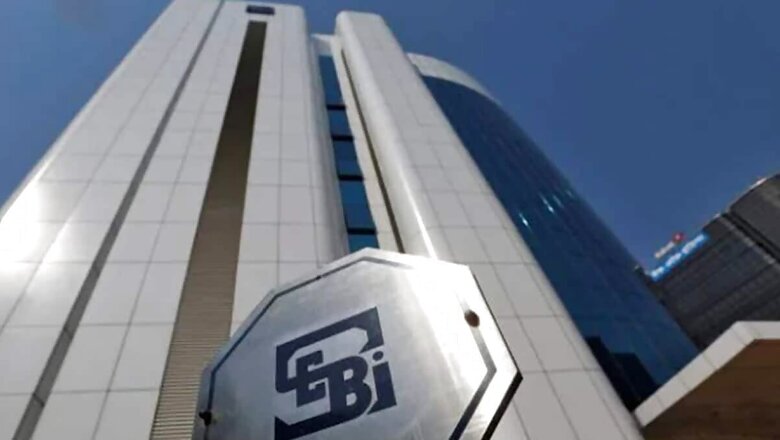
views
The Securities and Exchange Board of India (Sebi) has recently introduced new regulations targeting financial influencers, or finfluencers. The Sebi board approved rules to limit partnerships between its regulated entities and unregistered individuals. Additionally, Sebi proposed that mutual fund schemes must disclose ‘risk-adjusted return’ alongside the standard return to aid investors in making well-informed decisions.
Moreover, Sebi has increased the basic demat account limit to Rs 10 lakh to encourage greater investor participation.
Check top 3 changes announced by Sebi in the last few weeks;
Sebi Clears Fininfluencers Framework
Sebi also decided to regulate financial influencers or finfluencers amid growing concerns about potential risk associated with such persons.
On the fininfluencers, to address the concerns related to certain persons including unregulated entities inducing investors to deal in securities based on inappropriate claims, Sebi board approved norms to restrict associations between its regulated entities and unregistered individuals.
This came amid growing concern over the potential risks associated with unregulated finfluencers who might offer biased or misleading advice. They usually work on a commission-based model.
The persons regulated by Sebi and the agents of such persons will not have any association like any transaction involving money, referral of a client, interaction of information technology systems with any other person who, directly or indirectly, provides advice, recommendation or makes explicit claim of return or performance.
Finfluencers have significantly impacted their followers’ financial decisions in the last few years and thus Sebi’s regulatory framework can make them accountable and responsible for the advice they provide.
Also, the regulator has decided to create a closed ecosystem for fee collection by Sebi-registered Investment Advisers (IAs) and Research Analysts (RAs) from their clients.
The regulator is also tightening its actions on market manipulators courtesy the advanced technological inputs, she said, adding that mischief on SME boards will also be acted against.
Futures and Options (F&O)
Sebi chairperson Madhabi Puri Buch also went public with her concerns on the macroeconomic implications of retail investors’ speculative bets in the futures and options (F&O) segment.
She said people are borrowing money and household savings are drying because of such bets, and announced that the Sebi has formed an expert working group to look into this.
Sebi Raises Basic Demat Account Limit to Rs 10 Lakh to Boost Investors’ Participation
To boost the participation of small investors in the securities market, Sebi increased the threshold for the basic service demat account to Rs 10 lakh from the current Rs 2 lakh.
The new guidelines will come into force from September 1, 2024.
Benefits
Increasing the limit of securities’ value held in the Basic Services Demat Account (BSDA) will encourage small investors to trade in the stock market and ensure their financial inclusion.
A basic service demat account, or BSDA, is a more basic version of a regular demat account. The facility was introduced by markets regulator Sebi in 2012 to reduce the burden of demat charges on investors with small portfolios.
On eligibility for BSDA, Sebi said an individual is eligible for a BSDA if he/she meets certain criteria such as the investor has only one demat account as the sole or first holder, has only one BSDA in his name across all depositories and the value of securities in the account does not exceed Rs 10 lakh for both debt and non-debt securities combined at any time.
Before this, an individual was allowed to hold debt securities worth up to Rs 2 lakh and other than debt securities worth up to Rs 2 lakh in a single demat account to be eligible for BSDA.
For portfolio values up to Rs 4 lakh, Sebi said that the annual maintenance charge for a BDSA would be nil and for portfolio values of above Rs 4 lakh and up to Rs 10 lakh, the charges would be Rs 100.
However, if portfolio value exceeds Rs 10 lakh then BDSA should automatically be converted into a regular demat account.
Regarding services for BDSA, the regulator said that electronic statements would be provided free of cost to such account holders, besides, physical statements can be charged at Rs 25 per statement.
As per the circular, Depository Participants (DPs) will open only BSDA for eligible accounts unless the account holder opts for a regular demat account via email.
DPs must review and convert existing eligible demat accounts to BSDA within two months unless the account holder opts to keep their regular demat account via email. This review will continue at the end of each billing cycle.
Earlier this month, Sebi presented a consultation paper on enhancing the threshold limit for BSDA.
Sebi Proposes Mandatory Disclosure of ‘Risk-adjusted Return’ by Mutual Funds
Sebi also proposed mandatory disclosure of ‘risk-adjusted return’ along with the return of a mutual fund scheme to help investors make informed investment decisions.
Risk-adjusted return (RAR) of a scheme portfolio represents a more holistic measure of the scheme’s performance because it quantifies the amount of return generated by a mutual fund scheme for each unit of risk taken to achieve that return.
The current regulatory framework does not mandate the disclosure of RAR along with the returns of an MF scheme.
Further, there is no uniform practice followed by asset management companies (AMCs) regarding disclosure of RAR of their scheme.
The return on investment is a major factor attracting investors to invest in any MF scheme and is highlighted by the AMCs while marketing respective schemes.
Considering the significance of volatility of performance in determining the suitability of MF schemes, the RAR of the scheme should be disclosed along with disclosure of its scheme performance, Sebi said in its consultation paper.
To bring uniformity across different MFs, Sebi has also proposed a methodology for the calculation of IR for different categories of mutual fund schemes.
Sebi has sought comments from the public till July 19 on the proposals.
(With PTI inputs)



















Comments
0 comment